Editorials

The value of time: The more you move, the lower your risk to develop type 2 diabetes
The wide benefits of being regularly engaged in physical activity to prevent or delay cardiometabolic diseases have been known for decades. However, accurately measuring physical activity in epidemiological research has been challenging as it primarily relied on self-report questionnaires, the limitations of which have been documented in several studies. Indeed, self-report questionnaires often lead to … Continued See More
Visceral adiposity: a key driver of non-alcoholic fatty liver disease
Liver fat accumulation/non-alcoholic fatty liver disease (NAFLD) is a highly prevalent condition and has become a major cause of liver failure. Imaging studies have shown that excess liver fat is frequently accompanied by an excess of abdominal visceral adipose tissue. Excess visceral adiposity is associated with an increased risk of type 2 diabetes and cardiovascular … Continued See More
Eat well and move: another success story!
Being physically active and having a high-quality dietary pattern are two key features of our lifestyle associated with a healthier cardiometabolic risk profile, contributing to longer and healthier lives. However, beyond their individual influence on cardiometabolic risk, what about the mortality risk associated with these two important markers of our lifestyle when they are simultaneously … Continued See More
NAFLD and cardiometabolic outcomes: contribution of excess visceral adiposity
Many studies worldwide have reported a close relationship between a high-risk obesity pattern, visceral obesity, and an altered cardiometabolic risk profile beyond total adiposity. Moreover, excess visceral adiposity is a significant risk factor for both cardiovascular disease (CVD) and type 2 diabetes. Non-alcoholic fatty liver disease (NAFLD), another prevalent condition frequently observed among patients with … Continued See More
Cardiovascular health: Sleep well, live well!
In 2010, the American Heart Association (AHA) introduced the concept of Life’s Simple 7 to define ideal cardiovascular health. This proposal was a major paradigm shift, which moved the focus from cardiovascular disease risk management to the promotion of cardiovascular health. Among the Life’s Simple 7’s criteria, we find not only biological risk factors (healthy … Continued See More
Further evidence that cardiorespiratory fitness is a vital sign!
Cardiovascular disease (CVD) as well as cancer are two major causes of mortality worldwide. Despite the pharmacotherapies and increasingly specialized techniques available to the medical community to manage these chronic diseases, it is also important to intervene upstream in order to prevent their development. Adopting a healthy and active lifestyle, which benefits in the prevention … Continued See More
Low-fat diet versus Mediterranean diet in secondary prevention: What is the best option?
Nowadays, medical treatment for cardiovascular disease (CVD) involves a comprehensive set of procedures and drug therapies. However, lifestyle habits remain important to target in order to optimally manage CVD risk. To further explore this issue, the investigators of the CORDIOPREV study have compared the effects of a low-fat diet versus a Mediterranean diet on the … Continued See More
Daily step count and mortality: A meta-analysis of 15 international cohorts provides new data
It is well documented that regular physical activity is associated with a lower risk of morbidity and mortality related to chronic diseases such as cardiovascular disease, type 2 diabetes and pulmonary diseases. Furthermore, a physically active lifestyle also considerably improves quality of life. As a very simple measurement of physical activity, daily step count has … Continued See More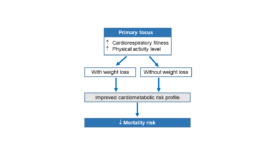
Should weight loss be the primary target to reduce health risk?
The worldwide prevalence of overweight and obesity is a source of concern and we have no evidence that this situation will improve in the short term. Multiple weight loss programs have been developed and several of them include dietary and physical activity/exercise components. However, most approaches have generated mixed results over the long term as … Continued See More
Socio-economic disparities and physical inactivity
The harmful consequences of physical inactivity on morbidity and mortality are well documented. Physical inactivity is an independent risk factor for premature mortality and many chronic diseases such as type 2 diabetes, cardiovascular disease and certain types of cancer. Although the beneficial impact of having a physically active lifestyle is recognized, a significant proportion of … Continued See More
Benefits of physical activity and mortality: Beyond the waistline
The acute and long-term benefits of physical activity have long been recognized. Through improvements in glucose-insulin homeostasis, lipoprotein-lipid profile and many other metabolic pathways, physical activity promotes health and reduces the risk for the development of chronic societal cardiometabolic diseases such as type 2 diabetes and cardiovascular disease, with beneficial consequences on mortality. Moreover, it … Continued See More
Healthy lifestyle habits: a focus of the American Heart Association
Things change… and hopefully for the better! A lot of progress was made over the last decades in our understanding of the pathophysiology of chronic diseases such as type 2 diabetes and cardiovascular disease. Nowadays, patients who have access to medical procedures and treatments in the field of cardiology can enjoy a much longer life … Continued See More
New dietary guidance from the American Heart Association
More than a decade ago, a strategic committee chaired by the current president of the American Heart Association (AHA), Dr. Donald Lloyd-Jones, proposed a paradigm shift in cardiovascular medicine: move the focus from the battle against cardiovascular disease (CVD) (although legitimate) to the promotion of cardiovascular health. In order to achieve this strategic goal, ideal … Continued See More
The ICCR salutes the vision of the AHA leadership in promoting primordial prevention!
More than a decade ago, a strategic committee chaired by the current president of the American Heart Association (AHA), Dr. Donald Lloyd-Jones, proposed a paradigm shift in cardiovascular medicine: move the focus from the battle against cardiovascular disease (CVD) (although legitimate) to the promotion of cardiovascular health. In order to achieve this strategic goal, ideal … Continued See More
Celebrating the 100 years of the Physiological Reviews journal
Physiological Reviews, a review journal of the American Physiological Society, celebrates this year its 100th anniversary. The journal addresses topics relevant to various disciplines such as physiology, neuroscience, cell biology, and is targeted at basic scientists and clinicians with an interest in pathophysiology. Physiological Reviews is published quarterly and its 2020 impact factor reached 37.312. … Continued See More
The study of atherosclerosis using tools of the 21st century: The PESA study
Valentin Fuster is an outstanding academic cardiologist who needs no introduction. The scope of his work and the contribution of his team to the management and prevention of cardiovascular disease is simply remarkable. In a recent review article published in the high-impact Journal of the American College of Cardiology, for which he also acts as … Continued See More
The discovery of insulin: Our humble tribute
Insulin is certainly a star among the hormones involved in human metabolism. Indeed, before the discovery of this remarkable hormone made by Banting, Best, Macleod and Collip in 1921, the deficit in insulin production of patients living with type 1 diabetes had devastating consequences on their quality of life and they would tragically die at … Continued See More
Editorial: Surviving COVID-19: Do not forget physical activity!
The benefits of being physically active have been known for years. Regular physical activity reduces the risk of developing chronic cardiometabolic “lifestyle” diseases such as type 2 diabetes as well as cardiovascular and respiratory diseases. Considering the current COVID-19 pandemic, examining the additional benefits that regular physical activity could provide is particularly relevant. Using the … Continued See More
Editorial: Your parents were right! Eat all your veggies and have some fruits!
For decades, several national and international dietary guidelines emphasized consumption of vegetables and fruit as a component of a healthy diet. Many public health campaigns have therefore been launched to promote the importance of eating fruits and vegetables on a daily basis. Despite these efforts, our current fruit and vegetable intake remains suboptimal, particularly among … Continued See More
Editorial: Waist circumference as a vital sign in clinical practice is being recognized in a global consensus paper published in Nature Reviews Endocrinology
Although many studies published over the last decades have consistently shown that a large waist circumference is associated with a deteriorated cardiometabolic risk profile predictive of an increased risk of morbidity and mortality, it is still not systematically measured in clinical practice. In 2017, the International Atherosclerosis Society (IAS) and the International Chair on Cardiometabolic … Continued See More
Editorial: Lifestyle, obesity and health: News from Australia!
The International Chair on Cardiometabolic Risk (ICCR) co-organized an international conference in collaboration with the Australian and New Zealand Obesity Society (ANZOS) and the Australasian Society of Lifestyle Medicine (ASLM). The ANZOS-ASLM-ICCR 2019 conference was held in Sydney, Australia from October 16 to 18. Through this partnership, the ICCR was able to contribute to the … Continued See More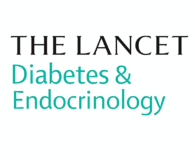
Editorial: Visceral obesity as a risk factor for chronic societal disease is being recognized in a global consensus paper published in the prestigious medical journal The Lancet Diabetes and Endocrinology
In 1983, using computed tomography, an imaging technique that was not used at the time for measuring body fat, a team of researchers from the Department of Internal Medicine at Osaka University led by Prof. Yuji Matsuzawa showed for the first time that there were substantial individual differences in the way human beings would store … Continued See More
Editorial: SAVE THE DATE! The ANZOS-ASLM-ICCR 2019 Joint Scientific Meeting will be held in Sydney, Australia, from 16 to 18 October 2019
The ANZOS-ASLM-ICCR 2019 Joint Scientific Meeting will be held in Sydney, Australia, from 16 to 18 October 2019 at the International Convention Centre in Sydney. This year sees the coming together of 3 outstanding organisations in the Australian New Zealand Obesity Society (ANZOS), the Australasian Society for Lifestyle Medicine (ASLM) and the International Chair on … Continued See More
Editorial: 2018 Annual Conference of Chinese Medical Association
The ICCR held its third collaborative activity with the Chinese Medical Association during the 2018 International Forum on Continuing Education for Chronic Diseases Management, which took place in October 2018. On this occasion, Professor Qiang Zeng, Director of the Health Management Association, gave us the opportunity to hold a three-hour session, prior to the opening … Continued See More
Editorial: The visceral obesity phenotype: Deeply scrutinized at the IAS/ICCR satellite symposium
Co-chaired by Drs. Yuji Matsuzawa and Jean-Pierre Després, the satellite symposium held in Toronto on June 13, 2018, and entitled “Visceral adiposity and related hypertriglyceridemia: From etiology to clinical management” gathered several international delegates including ten speakers. The morning session was dedicated to the pathophysiology of functional/dysfunctional adipose tissue as well as to the review … Continued See More
Editorial: IAS/ICCR Satellite Symposium, June 13, 2018
Abdominal obesity, visceral obesity in particular, is the most dangerous form of obesity. An excess of abdominal visceral fat is associated with metabolic disorders leading to type 2 diabetes, cardiovascular disease and certain forms of cancer. Taking the opportunity of the XVIIIth International Symposium on Atherosclerosis in Toronto to be held on June 9-12, 2018, … Continued See More
Editorial: Marja-Riitta Taskinen, recipient of the 2017 Robert Levy Memorial Lecture
The Robert Levy Memorial Lecture was established in 2001 by the Council on Lifestyle and Cardiometabolic Health (previously the Council on Nutrition, Physical Activity and Metabolism) in recognition of Dr. Levy’s distinguished career in the field of lipidology and cardiovascular medicine. This year, Marja-Riitta Taskinen, an Emerita Professor of Medicine from the University of Helsinki … Continued See More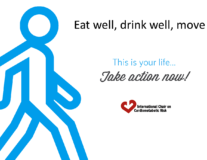
Editorial: Achieving ideal cardiovascular health: Still a long way to go!
According to the latest statistics of the American Heart Association (AHA), death rates attributable to cardiovascular diseases (CVD) have declined by 28.8% from 2003 to 2013 [1]. Over the same period, the number of CVD deaths per year has declined by 11.7%. Despite these encouraging news, CVD still accounts for 31% of all deaths in … Continued See More
Editorial: The Annual Conference of Chinese Health Management Society
For its second collaboration with the Chinese Medical Association, the ICCR held a conference in Chongqing under the presidency of Professor Qiang Zeng, Director of the Health Management Institute. It was an opportunity for the ICCR to participate in the fight against obesity and the huge epidemic of type 2 diabetes and cardiovascular disease in … Continued See More
Editorial: The 6th ICCR Congress on Chronic Societal Cardiometabolic Diseases: scientists mobilized to develop “lifestyle medicine” solutions and population-based approaches
The Organizing Committee of the 6th ICCR Congress would like to thank all the speakers and participants who attended the meeting held in Québec City on May 15-17, 2017. The high-quality scientific program involved several international leaders and covered the most recent advances in the field of chronic societal cardiometabolic diseases, from the pathophysiology of … Continued See More
Editorial: Abdominal obesity: a causal risk factor for cardiometabolic diseases
The strong association between abdominal obesity and the risk of type 2 diabetes (T2D) and coronary heart disease (CHD) has been validated by several large-scale epidemiological prospective studies over the past 40 years. Many of these studies have also shown that abdominal obesity predicts the risk of T2D and CHD regardless of body weight and … Continued See More
Editorial: 2016 International conference on weight management, lifestyle, and cardiometabolic disease
The International Chair on Cardiometabolic Risk (ICCR) and the Chinese Medical Association co-organized the first Chinese International Congress on Weight Management, Lifestyle, and Cardiometabolic Disease. At the opening of the congress, Mr. Jean-Claude Coubard, Executive Director of the ICCR, described the structure, composition and objectives of the Chair. Expert members of the Chair and Chinese … Continued See More
Editorial: ICCR/EHLA UK in partnership with The Sugar Reduction Summit
On 22 September 2016, the International Chair on Cardiometabolic Risk (ICCR) and the European Healthy Lifestyle Alliance (EHLA) UK partnered with The Sugar Reduction Summit to deliver a one-day conference for public health professionals, policymakers, industry representatives, academics, and health and wellness communities. The day explored the impact of both legislative and voluntary action to … Continued See More
Editorial: The International Chair on Cardiometabolic Risk Global Sugar-Sweetened Beverage Sale Barometer
The epidemics of obesity and type 2 diabetes are affecting most if not all developed countries around the world. An analysis published in The Lancet showed that the number of patients with type 2 diabetes almost quadrupled since 1980. While the percentage of overweight or obese people is highest in North America and Europe, obesity … Continued See More
Editorial: The 2015 dietary guidelines for Americans: The “culture of health” will have to wait
By law, the U.S. government is required to publish a new version of its dietary guidelines every five years and they have being doing so since 1980. These guidelines never go unnoticed as they influence the advice given by doctors and other health professionals to their patients, the composition of school and other public institution … Continued See More
Editorial: Europe cannot afford to sit still
Obesity is one of the biggest threats to public health worldwide. Efforts to tighten the belt on “the epidemic of the 21st century” should be top priority for all concerned, the European Union (EU) included. On September 16, 2015, European Healthy Lifestyle Alliance (EHLA) members met during a Strategy meeting in Brussels to exchange on … Continued See More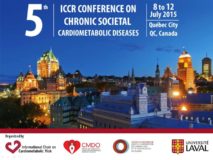
Editorial: Highlights of the 5th ICCR Congress on Chronic Societal Cardiometabolic Diseases
The Organising Committee of the 5th ICCR Congress would like to thank all participants for taking part in the meeting held in Québec City on July 8-12, 2015. During the conference, several hundred participants including specialists and general practitioners, researchers, residents, graduate students, nutritionists, kinesiologists and other healthcare professionals reviewed all aspects related to the … Continued See More
Editorial: An international multidisciplinary forum putting healthy lifestyle habits at the centre of prevention and clinical management of chronic societal diseases
Internationally renowned speakers will present their most recent scientific data on physical activity, exercise, nutrition and health with a strong focus on prevention at the 5th ICCR Congress on Chronic Societal Cardiometabolic Diseases. The objectives of the congress are: To better understand the pathophysiology of cardiometabolic diseases. To review large cardiometabolic imaging studies showing links … Continued See More
Editorial: Welcome to the 5th edition of the ICCR Congress now named ICCR Congress on Chronic Societal Cardiometabolic Diseases
Initially named the International Congress on Abdominal Obesity, the ICCR conference has rapidly become the international platform to discuss novel approaches and share scientific and clinical data to benefit healthcare professionals, clinicians and scientists interested by the etiology and the management/prevention of abdominal obesity. As abdominal obesity is a central condition associated with the development … Continued See More
Editorial: Eat well, drink well, move . . . A small step for you, a big step for Europe
On September 17, 2013, the International Chair on Cardiometabolic Risk organized a one-day special conference which brought together international experts, politicians, nongovernmental organizations (NGOs) and stakeholders. This unique event was held at the European Parliament in Brussels. Obesity is a lifestyle disease that is becoming one of the greatest public health challenges of the 21th … Continued See More
Editorial: Regional fat distribution, fatty acid metabolism and adipocytes
Because body fat distribution is such a powerful predictor of the metabolic consequences of obesity, we originally sought to understand whether free fatty acid (FFA) release was different in upper body obese vs. lower body obese adults. We hypothesized that increased FFA release, as opposed to decreased clearance, might be an explanation for the metabolic … Continued See More
Editorial: Nutrition transition and chronic disease prevention in China
In the past several decades, China has been experiencing rapid economic and social development with concomitant shifts in lifestyle habits and dietary structure. These changes have led to remarkable nutritional and epidemiologic transitions [1]. In particular, traditional dietary patterns are being lost as the population adapts to more industrialized and urban food environments [2]. At … Continued See More
Editorial: The importance of primordial prevention for cardiovascular health
Cardiovascular disease (CVD) mortality has decreased over the last decades, largely because of the progress that we have made in our understanding of major modifiable factors contributing to its etiology such as smoking, hypertension and high cholesterol levels. By targeting smoking cessation, cholesterol lowering by drugs and diet and by detecting and managing hypertension, we … Continued See More
Editorial: Hydration and cardiometabolic health: an update from the ICCR
On numerous occasions, scientists associated with the research and educational activities of the International Chair on Cardiometabolic Risk (ICCR) have raised concerns regarding the progressive change observed in our drinking habits over the last 40 years. For instance, the consumption of milk has decreased and been progressively substituted for sugar-sweetened beverages [1]. Numerous epidemiological studies … Continued See More
Editorial: «Eat less and exercise more» . . . How do we do it?
Prevalence of obesity has achieved massive proportions in several countries [1]. Even parts of the world with a low absolute prevalence of overweight/obesity are now showing spectacular increases leading to a rapid rise in the prevalence of chronic metabolic diseases such as type 2 diabetes [2]. Obviously, to reduce the adiposity of high-risk obese patients, … Continued See More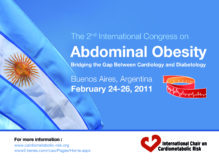
Editorial: The 2nd International Congress on Abdominal Obesity in Buenos Aires: The ICCR enters a new era!
The 2nd ICAO in Buenos Aires: a great success! With more than 500 participants from 60 countries, the International Chair on Cardiometabolic Risk (ICCR) thanks all attendees and speakers who made this 2nd meeting a resounding success. The feedback received from the participants as well as from the invited speakers was excellent. At the ICCR, … Continued See More
Editorial: Sugar-sweetened beverages and risk of type 2 diabetes
In recent decades, consumption of sugar-sweetened beverages (SSBs) has been rising rapidly worldwide. SSBs include the full spectrum of soft drinks (soda), fruit drinks, and energy and vitamin water drinks. In the US between the late 1970’s and 2001 the percentage of total calories consumed from SSBs increased from 3.9% to 9.2% [1]. Similar trends … Continued See More
Editorial: The ICCR has had another successful joint meeting with the EAS in Hamburg
The International Chair on Cardiometabolic Risk (ICCR) has organized another successful and well attended symposium at the European Atherosclerosis Society (EAS) meeting held from June 20 to 23, 2010 in Hamburg, Germany. This joint ICCR/EAS symposium, co-chaired by Prof. Marja-Riitta Taskinen from University of Helsinki, Finland and by Prof. Luc Van Gaal from University of … Continued See More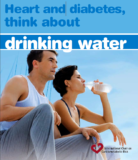
Another successful ICCR symposium at the MEDEC 2010 Conference in Paris!
On March 17, the International Chair on Cardiometabolic Risk (ICCR) held another successful and well-attended symposium at the MEDEC 2010 which is the annual French primary care physicians conference. The purpose of the symposium was to raise the family physicians awareness on the relationships between the consumption of sugar-sweetened beverages (SSB) and the risk of … Continued See More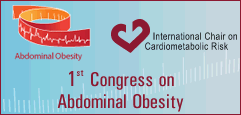
Editorial: The first International Congress on Abdominal Obesity: a resounding success!
The First International Congress on Abdominal Obesity was held in Hong Kong on January 28-30. After 5 years of activities, we, at the International Chair on Cardiometabolic Risk (ICCR), felt that the time had come to organize an international meeting devoted entirely to abdominal obesity. Indeed, despite the fact that there has been a proliferation … Continued See More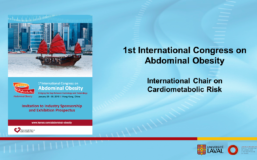
Editorial: See you in Hong Kong!
When the International Chair on Cardiometabolic Risk (ICCR) was launched in 2005, a key objective identified by the multidisciplinary group of experts gathered together under the umbrella of the Chair was the development of a comprehensive educational program on the causes and consequences of abdominal obesity. This led to the creation of our educational website … Continued See More
Editorial: Interleukin-6: A link between obesity, insulin resistance and NAFLD/NASH?
Interleukin-6 (IL-6) is a highly proinflammatory molecule in many cells, including adipose and liver cells. It is widely produced, but the adipose tissue accounts for a substantial part (around 30%) [1]. The release of IL-6 is related to adipose cell size and, thus, increased in obesity [2]. Elevated levels of IL-6 induce insulin resistance in … Continued See More
Implications of recent clinical trials targeting glycemia to reduce cardiovascular risk: insights on prevention of cardiovascular disease in insulin resistant syndromes
People with type 2 diabetes mellitus experience higher risk for cardiovascular disease (CVD) than persons without diabetes. The risk, however, has declined over the years as the recommendations for both primary and secondary prevention of cardiovascular (CV) events have been strengthened primarily through LDL lowering with statins and the adoption of lower targets for blood … Continued See More
Editorial: Fire extinguishers. Are there new strategies for controlling the inflammation that ignites atherosclerosis?
Gratifying advances over the last decades have furnished cardiovascular specialists with multiple tools to address many aspects of the traditional risk factor profile. We now have at our disposal effective methods for managing high levels of LDL, controlling blood pressure, and even curbing smoking, which has finally declined in the United States. Nonetheless, even those … Continued See More
Editorial: Metabolic abnormalities in people with abdominal obesity: low levels of high-density lipoproteins
An inverse relationship between the level of high-density lipoprotein (HDL) cholesterol and the risk of developing premature cardiovascular disease (CVD) has been a consistent finding in prospective population studies. In several of these studies the level of HDL cholesterol has been the single most powerful lipid predictor of future CHD events. The increased CVD risk … Continued See More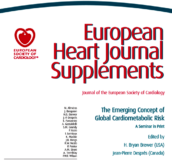
Editorial: International Chair on Cardiometabolic Risk to publish a supplement in the European Heart Journal
Among the Chair’s many educational and information activities, publications are one of the tools on which Chair members place special focus. These publications capture the work done by Chair members as well as by other experts invited to our bi-annual meetings. Whether they are original contributions or review articles, Chair publications are in keeping with … Continued See More
Editorial: Recent activities of the Chair
The International Chair on Cardiometabolic Risk (ICCR) held another productive meeting in Paris on December 15, 2007. The meeting was a success on several fronts and enabled us to generate content for the next issue of the CMReJournal, our new e-journal that provides concise reviews of recent key publications and endeavours to convey important clinical … Continued See More
Editorial: Abdominal obesity and CHD risk: further evidence from the EPIC-Norfolk large prospective study
In our previous editorial, we reviewed the results of the large international observational study (IDEA) published in October 2007 [1]. This study provided evidence that waist circumference predicted diabetes and cardiovascular disease (CVD) prevalence in a sample of nearly 170,000 patients followed by primary care physicians in 63 countries worldwide. Although it was very large … Continued See More
The IDEA study: From kilos and metres squared to centimetres and mmol/l
As an anthropometric marker of abdominal obesity, an elevated waist circumference is gaining recognition as a risk factor for type 2 diabetes and cardiovascular disease (CVD) 1-3. However, some still debate whether measuring the waistline is feasible in clinical practice and whether this measurement adds to the information provided by an index of relative weight … Continued See More